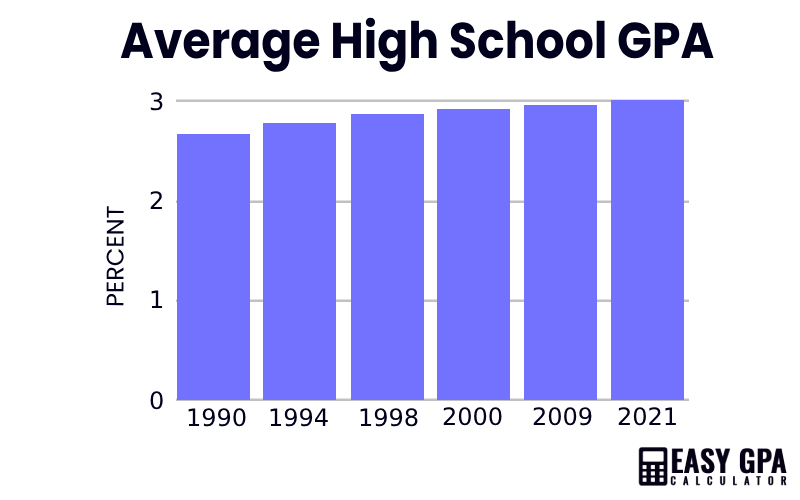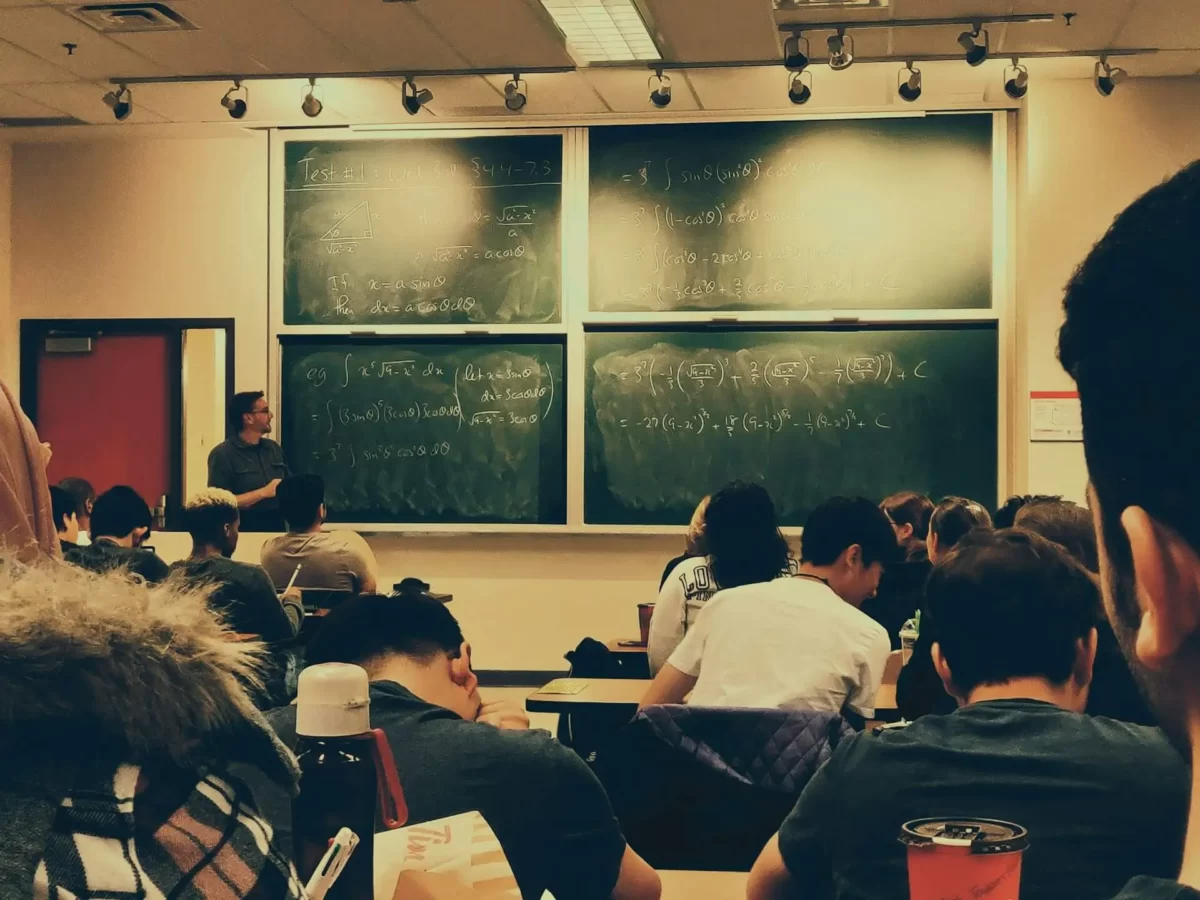As a high school student, you’ve probably heard repeatedly how important your GPA is. But have you ever wondered what the average GPA for high schoolers will be in 2023? In this post, we’ll explore the national average, disparities by gender and ethnicity, the long-term impact of your GPA, and even some strategies to improve it. Get ready to dive into the world of GPAs and discover how this seemingly simple number can shape your future.
Short Summary
- The national average high school GPA in 2023 is 3.1 for female students and 2.9 for male students, with Asian students having the highest GPA (3.52).
- High school GPAs are essential factors in college admissions, graduate programs acceptance rates, and future earning potentials.
- Effective time management, study habits & utilizing resources can help improve one’s high school GPA significantly to increase chances of success both academically & professionally
Understanding the Average High School GPA

GPA, or Grade Point Average, is an essential aspect of your academic life, especially your GPA in high school. It indicates your academic performance on a scale from 0 to 4.0, with 4.0 being the highest possible GPA. A student’s grade, particularly a good high school GPA, typically ranges between 3.50 and 4.00. It is a significant element in college admissions, as it can impact your college GPA and future opportunities.
But what factors influence your high school GPA, and how do weighted and unweighted GPAs come into play? Several factors can influence one’s high school GPA, such as the course material’s complexity, the institution’s grading scale, and the amount of Carnegie units taken.
Moreover, it’s crucial to understand the distinction between weighted and unweighted grade point average (GPA) when comparing your GPA against national averages provided by the national center.
Factors Affecting High School GPA

Class difficulty plays a significant role in determining your high school GPA. For instance, more challenging courses may have stricter grading criteria, leading to a lower GPA for the same level of effort compared to less challenging courses. Additionally, a school’s reputation can influence your GPA. Schools with a more prominent reputation, such as Ivy League schools, may have higher student standards.
Grading policies also affect your GPA, as different educational institutions may have other criteria for assigning grades. Understanding these factors can help you make informed decisions about course selection and study habits to improve your GPA. For instance, if you know that the grading policy at your school is particularly stringent, you can focus on honing your study skills and seeking additional support to achieve higher grades.
Weighted vs. Unweighted GPA
Weighted GPAs consider the difficulty of courses, whereas unweighted GPAs do not. This distinction can impact the average female GPA and the average male GPA. Comparing weighted and unweighted GPAs presents a challenge because they consider different factors.
For example, a student with a higher unweighted GPA may have taken less challenging courses, while a lower weighted GPA may have taken more rigorous classes. This makes direct comparisons between the two potentially misleading.
Therefore, when evaluating your GPA, it’s essential to consider the context of the courses you’ve taken and the grading policies at your school.
National Average High School GPA in 2023
Female students have an average high school GPA of 3.10 as of 2023. Male students are lagging, with an average GPA of 2.90. The average high school GPA has steadily increased over the years, reflecting the efforts of high school students. Data from the 1950s indicates an average of 2.52, while the 1990s saw an average of 3.11. In core subject areas, the average GPA is 2.79.
To provide a broader perspective, it’s essential to consider state-by-state comparisons of average high school GPAs in high schools, as regional variations can impact these averages.
State-by-State Comparison
State-by-state comparison of average high school GPAs is a method of evaluating the average high school GPAs of high schoolers in various states. For instance, the average GPA in California can vary depending on the institution or school. UC Davis has an average GPA range of 3.95-4.24, while UC Berkeley has an average GPA of 4.39. It is essential to note that these averages may differ across different schools and universities in the state.
Regional differences in average high school GPAs can be attributed to educational policies, resources, and socioeconomic conditions. Understanding these regional variations can help you assess your GPA in the context of where you live and what resources are available.
High School GPA by Gender and Ethnicity

As mentioned earlier, there are disparities in high school GPA by gender, with female students having a higher average GPA (3.1) than male students (2.9). In addition to gender, there are significant differences in average high school GPA among different racial groups. Asian students had the highest average GPA of 3.52. White, Hispanic, and Black students had an average GPA of 3.23, 2.98, and 2.68, respectively.
Understanding these disparities is essential for individual students, educators, and policymakers. By being aware of how their academic performance compares to others within their racial group and across different groups, they can more accurately gauge their strengths and areas for development.
Reasons for Disparities
The potential causes of GPA disparities may include systemic biases and unequal access to resources. For example, female students may face backlash when challenging gender stereotypes, leading to lower expectations of success and, consequently, lower GPAs.
Acknowledging and addressing systemic barriers affecting academic achievement differently across various groups is essential for creating a more equitable and inclusive educational system. By doing so, we can strive for a higher GPA while ensuring fair and honest access to education for all.
Addressing these disparities and striving to create a more equitable educational system benefits all students, regardless of their gender or ethnicity.
The Role of High School GPA in College Admissions

High school GPA is a valuable metric for assessing academic abilities in college admissions. Most Ivy League schools typically accept students with GPAs close to 4.0, although a perfect 4.0 GPA is not a prerequisite for admission. Achieving success in other application components, such as standardized test scores or extracurricular activities, may offset a lower GPA.
In addition to high school GPA, extracurricular activities, the rigor of a student’s curriculum, standardized test scores, and other application materials can all influence the acceptance or rejection of a college application. Let’s examine the importance of a high GPA for admission to competitive colleges and Ivy League schools.
Competitive Colleges and Ivy League Schools
A high GPA is crucial for admission to competitive colleges and Ivy League institutions, as it demonstrates your dedication to your studies and your ability to manage the rigors of college-level coursework. However, other criteria are also considered when evaluating applications for Ivy League schools, such as standardized test scores and extracurricular activities.
To demonstrate academic rigor when applying to an ivy league school, enrolling in challenging courses such as Advanced Placement (AP) or International Baccalaureate (IB) classes is essential. These courses help showcase your academic abilities and commitment to learning, increasing your chances of becoming one of the admitted students at Ivy League schools.
Strategies to Improve Your High School GPA

Improving your high school GPA is possible if you implement effective time management and study habits and utilize available resources. Focusing on these areas can boost your academic performance and increase your chances of success in college and beyond.
Let’s delve deeper into time management, study habits, and the importance of seeking help and utilizing resources to improve your GPA.
Time Management and Study Habits
Effective time management is crucial for academic success. Setting achievable goals, dividing tasks into smaller components, and establishing a timeline can help you stay organized and on track. Creating and adhering to a study schedule also ensures that you’re consistently working towards your objectives.
Developing strong study habits is equally important. Studying in a quiet environment, taking regular breaks, and employing study aids such as flashcards and practice tests can help you retain information more effectively. You can significantly improve your academic performance and GPA by honing your time management and study skills.
Seeking Help and Utilizing Resources
Don’t be afraid to seek help from teachers, counselors, and other resources to improve your GPA. These professionals can help you identify your academic strengths and weaknesses and develop more effective study practices. Furthermore, they can guide you in creating a plan to raise your GPA.
Tutoring services, online resources, and academic advisors can help you improve your GPA. Establish objectives, monitor your progress, and obtain feedback from your teachers and counselors to optimize your use of these resources. You can enhance your high school GPA and secure a brighter future with determination and the right support.
The Long-Term Impact of High School GPA
Your high school GPA can have a lasting impact on your future. Research has demonstrated that high school GPA is a reliable indicator of future remuneration and achievement in college. Maintaining a high GPA can positively affect academic and career outcomes.
Let’s explore the relationship between high school GPA and future earnings and the role of GPA in graduate school admissions.
GPA and Future Earnings
High school GPA plays a significant role in determining your future income. Education statistics reveal that higher high school GPAs generally lead to higher future earnings. Men can anticipate a 12% increase in future earnings for each rise in GPA, while women can expect a 14% increase.
These findings highlight the importance of maintaining a strong academic record throughout high school. Working diligently to improve your GPA can increase your chances of achieving higher earnings and greater career success.
GPA and Graduate School Admissions
High school GPA is critical in graduate school admissions, as it evaluates a student’s academic performance and capacity for success in a graduate program. A strong GPA can illustrate your dedication to your studies and your aptitude to manage the rigors of graduate-level coursework.
In addition to your GPA, graduate school admissions consider factors such as your coursework, standardized test scores, and other application materials. Maintaining a strong academic record throughout high school and college can increase your chances of being accepted into prestigious graduate programs and furthering your education.
Summary
In conclusion, your high school GPA is essential to your academic journey, influencing college admissions, future earnings, and graduate school prospects. By understanding the factors that affect your GPA, implementing strategies to improve it, and utilizing available resources, you can take control of your academic success and pave the way for a bright future. So, take charge of your GPA today and unlock limitless opportunities.
Frequently Asked Questions
Is 3.7 A bad GPA in high school?
A 3.7 GPA is impressive and places you in good standing at many colleges – it’s an outstanding GPA and a 92% percentile grade on a 4.0 scale.
Is a 5.0 GPA good in high school?
A 5.0 GPA is excellent and generally considered the highest grade possible in most high school point systems. Although rare, some schools design systems to allow students taking advanced courses to earn bonus points. As such, higher than a 5.0 GPA is attainable in certain circumstances.
Is a 2.5 GPA good in high school?
No, a 2.5 GPA is not considered good in high school. The national average for a GPA is around 3.0, and a 2.5 GPA puts you below that average. This means you’ve been mainly getting C-s and D+s in your classes.
What is the average GPA for a 12th grader?
Statistics show that the average GPA for a 12th grader is 3.00.
TACT Research conducted analyses to compare first-year college GPAs to high school GPA data, showing that the average high school GPA is 3.36, while the middle college GPA is 2.70.
What is considered a good high school GPA?
A good high school GPA is generally between 3.50 and 4.50.




